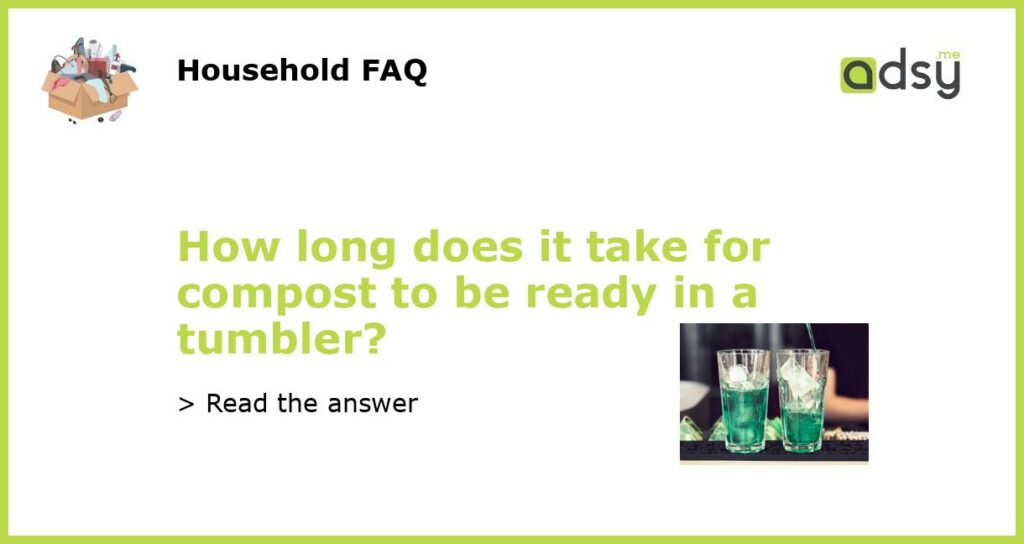Compost Tumblers: A Quick and Efficient Way to Compost
Composting is a great way to reduce waste and create nutrient-rich soil for your garden. Traditional composting methods can take several months to produce usable compost, but with a compost tumbler, the process can be significantly faster. So, how long does it take for compost to be ready in a tumbler?
The Composting Process in a Tumbler
Before we delve into the timeline, it’s important to understand how composting works in a tumbler. A compost tumbler is a container that can be rotated, allowing for easy mixing and aeration of the composting materials. This constant agitation helps to speed up the decomposition process.
The process starts by adding organic materials such as kitchen scraps, yard waste, and shredded paper into the tumbler. These materials are then mixed and occasionally watered to maintain the right moisture level. The continuous rotation of the tumbler allows the microbes and organisms responsible for decomposition to work efficiently on breaking down the materials.
As the composting process progresses, the organic matter inside the tumbler heats up due to microbial activity. This heat, combined with the proper ratio of carbon and nitrogen-rich materials, helps to break down the organic matter faster and kills any potential pathogens or weed seeds.
Factors Affecting Composting Time
Several factors can influence the composting time in a tumbler:
If done correctly, composting in a tumbler can typically take anywhere from 4 to 8 weeks.
Mixing and Aeration: Regularly rotating the tumbler ensures that the composting materials are thoroughly mixed and oxygenated. This allows for faster decomposition and prevents the formation of anaerobic conditions, which can slow down the process.
Size and Type of Tumbler: The size and design of the tumbler can also affect composting time. Bigger tumblers with more surface area can accommodate larger quantities of composting materials and may speed up the process. Additionally, tumblers with insulated walls can help maintain optimal temperature levels for faster composting.
Carbon-to-Nitrogen Ratio: The ideal carbon-to-nitrogen ratio (C:N ratio) for composting is around 30:1. Having the right balance of green (nitrogen-rich) and brown (carbon-rich) materials ensures that the microbes have enough nutrients to break down the organic matter efficiently. Failure to maintain the proper C:N ratio can lead to slower decomposition.
Moisture Levels: Adequate moisture is essential for microbial activity and decomposition. Compost should have a moisture content of around 40-60%. Too much moisture can lead to a soggy compost pile, while too little can slow down decomposition. Regularly monitoring and adjusting moisture levels is crucial for optimal composting time.
Recommended Composting Time in a Tumbler
If done correctly, composting in a tumbler can typically take anywhere from 4 to 8 weeks. This relatively short timeframe is one of the main advantages of using a tumbler compared to traditional composting methods.
However, it’s important to note that achieving fully matured compost may take longer. While the compost may be visually ready after a few weeks, allowing it to continue decomposing for a few more weeks will ensure that all the organic matter has broken down completely.
It’s also worth mentioning that different types of organic materials may decompose at different rates. Generally, smaller and softer materials, like kitchen scraps, will break down faster than larger woody materials, such as twigs or branches. Chopping or shredding larger materials before adding them to the tumbler can help expedite the composting process.
The Benefits of Composting in a Tumbler
Composting in a tumbler offers several benefits:
Composting in a tumbler is a quick and efficient way to produce nutrient-rich compost for your garden. With the right combination of mixing, aeration, moisture levels, and the proper C:N ratio, compost can be ready in as little as 4 to 8 weeks. Regularly monitoring and adjusting these factors will ensure optimal composting time and quality.






